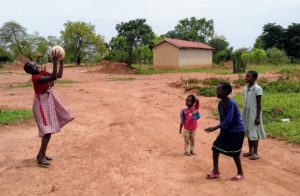
In this guest blog post, Building Tomorrow Fellow Henry Mulondo recounts the story of an 11-year old girl named Talindeka who is brought back to school through the relentless determination of another Fellow named Catherine Nabalende. Henry was inspired to write the story after witnessing Catherine successfully bring Talindeka, who was on the brink of child marriage, back to a school in Nakaseke District to fulfil her dream of studying to become a teacher, despite the repeated failed attempts of all other community members to do so. The recruitment and enrolment of out-of-school children through Fellows and Community Education Volunteers is a core pillar of our Thriving Schools Program, which is made possible through the generous support of Educate A Child.
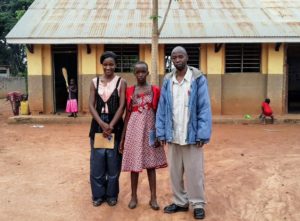
Building Tomorrow Fellow Catherine Nabalende (left) and Community Ambassador Mr. Wangoda (right) welcome Talindeka (middle) back to school.
The Building Tomorrow Fellowship offers a unique opportunity for young people to catalyse change in the underserved communities of Uganda, by working within the confines of the communities as they are, but also by reimagining what they might be.
Since my cohort began its journey more than a year ago, I have seen Fellows perform innumerable acts of social courage, large and small, almost daily, including the enrolment of out-of-school children.
One of these Fellows is Catherine Nabalende.
When I asked Catherine what her most memorable moment in the Fellowship was so far, Catherine, a determined young lady who has never stopped asking what she can do for the community she serves, described the outstanding achievement of enrolling Talindeka, a young out-of-school girl in Nakaseke District, back in class—a story that I witnessed first-hand and feel compelled to share.
Talindeka, age 11, was born and raised on a cattle corridor ranch in Central Uganda. Growing up with her somewhat wealthy grandfather, Talindeka’s education was often underplayed and sometimes even denied to her by her grandfather. Thus, although she had a dream of becoming a teacher that could only be possible through education, Talindeka was instead forced to help her grandfather’s family with housework, which undermined the whole future ahead of her.
As weeks became months when she was out of school, community members, including teachers, would often visit Talindeka’s grandfather to talk to him about his granddaughter’s career prospects in education. It is no secret that the grandfather would become outraged at the few community members who attempted to approach him about the issue, even chasing them off his property with his large cattle herding stick.
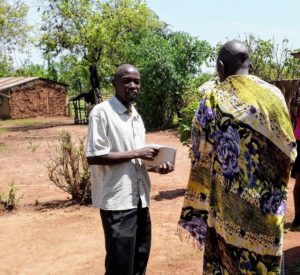
Mr. Wangoda, a Community Education Volunteer, persuades Talindeka’s grandfather to allow her back in school.
This unacceptable situation caught the attention of Catherine, who called upon a Building Tomorrow Community Education Volunteer, Mr. Wangoda, to make a home visit and persuade Talindeka’s grandfather to support her education and aspirations.
Mr. Wangoda knew he was not the first community member to meet with the grandfather on the issue of his granddaughter’s education, but he was determined to be the last.
He began the sensitive conversation by acknowledging the grandfather’s outstanding work on the farm and for having supporting his granddaughter thus far. Building up the courage, Mr. Wangoda paused for a moment and then bravely asked the grandfather, “Why give up now?”
In his characteristic way that the other community members who had tried to broach the subject knew so well, the grandfather became dismissive and immediately responded that issues regarding his granddaughter were, frankly, none of his business.
However, instead of joining the ranks of those who had tried and failed, Mr. Wangoda persisted and quoted an article from a training he had received from Catherine: “All children have a right to primary education,” he said. “Education can be a road to helping your granddaughter realize her dreams, and the reason I am here is to help us make a choice that is in her best interest.”
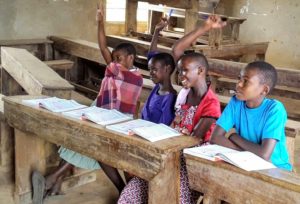
Talindeka actively enjoys classroom lessons on her first day at school.
Having already crossed a line, Mr. Wangoda continued to condemn a future whereby Talindeka would be uneducated in the face of disease, poverty, and many of the other challenges confronting Uganda. Instead, he suggested a future whereby his well-educated granddaughter could improve her grandfather’s business, fight diseases, or even become the next great politician. He bolstered his argument by citing examples of other young girls in the community who had the opportunity to pursue their education and pointed out that their success that was possible in large part due to the support of their parents and guardians who never gave up.
Mr. Wangoda humbly asked the grandfather to give his granddaughter that same chance to achieve her dreams.
Nodding, the grandfather took a moment to reflect upon Mr. Wangoda’s words, then responded, “Early Monday morning next week when the sun is up, Talindeka will be in school.”
Catherine and Mr. Wangoda had made the impossible possible.
Inspired by the big impact of just a short conversation, Catherine and Mr. Wangoda continued onward to other homes.
The majority of the community members with which I spoke about this story applauded these unlikely efforts and commented that if the Building Tomorrow Fellow and Community Education Volunteer had not acted in time, Talindeka would have, in just a few weeks, been forced into an early marriage.
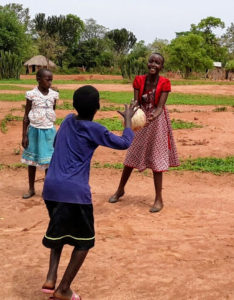
Talindeka loves playing sports and games with her classmates.
Moreover, because of this example, the community members have taken a pledge to preserve the idea that every young girl must have access to an education.
Reflecting on this outstanding achievement, Catherine admitted, “It wasn’t an easy decision to talk to the grandfather. But because our desire to maintain a reputation for social courage was stronger than the fear we had in approaching, our efforts succeeded. Moreover, I couldn’t stand idly by when this young girl’s future was in jeopardy.”
Talindeka is now in Primary 4 (fourth grade) at her local primary school. She still carries her dream of becoming a teacher someday, and she is now more determined than ever before to fully realize that dream.
In her remarks during a meeting with parents at school recently, Catherine reflected upon and narrated Talindeka’s story, using it as an example of what is possible when community members are mindful of the future of their children, many of whom are like Talindeka, and take up the cause of fighting for their right to education.
In a call to action, she declared, “We have proven that great progress is possible. We know how much remains to be done and if our efforts continue, if our will is strong, if our hearts are right, and if courage still remains our constant companion, then my dear parents and community leaders, I am confident that we shall overcome.”


Follow Us on Social Media